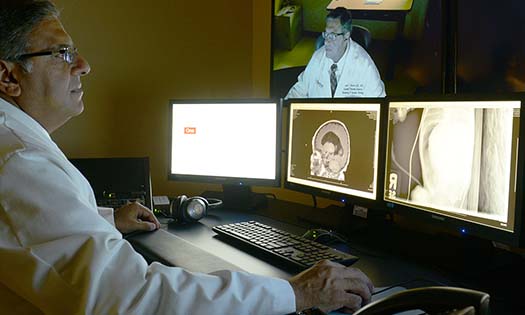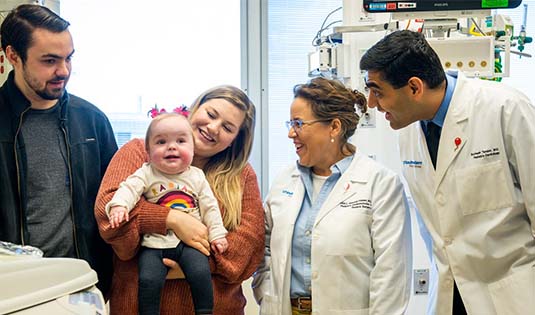It’s hard for parents to care for children with type 1 diabetes (T1D) – and even harder when those kids have a cold or the flu. Soumya Adhikari, M.D., Pediatric Endocrinologist at Children’s Health℠ and Associate Professor of Pediatrics at UT Southwestern, has seen this first-hand as an endocrinologist who fields questions about what to do when glucose and ketone levels fluctuate during illness. That’s why he and his colleagues at Children’s Health and UT Southwestern created an innovative solution: a mobile app called Diabetes Advisor.
The app uses real-time biometric data, like blood sugar readings, to create sick day action plans. This empowers families to take charge of T1D care, and it helps them answer pressing questions without having to schedule an appointment or wait for our team to call them back.
“Our patients know they can reach a nurse or doctor day or night, but this just gives them one more tool to supplement our in-person availability, so we’re excited about how this helps families manage sick days more independently and still get some immediate affirmation that they’re doing the right thing,” says Dr. Adhikari.
Personalized Sick Day Plans
To use Diabetes Advisor, parents enter their child’s blood sugar levels, urine or blood ketone levels, and answer standardized questions about fluid and food intake. The app uses this information – plus the child’s age, weight and normal insulin regimen – to calculate recommended insulin doses and fluid intake. It can then send optional reminder alarms to families to prompt them to recheck their child on a set schedule.
Families can also use the app to access the full diabetes education library that they receive from the Children’s Health treatment team at their initial visit, along with some innovative, mobile-friendly content, such as links to selected podcasts and videos.
How an Algorithm “Automates” Treatment
Dr. Adhikari and his team floated the idea for Diabetes Advisor during a department meeting about new diabetes sick day guidelines a few years ago.
"We know sick days are stressful, and we encourage parents to call us day or night,” Dr. Adhikari says. “But we also want parents to feel empowered to manage care without us when appropriate, and we thought an app could help.”
When he pitched the idea to our Virtual Health Team, they were on board and started working with Dr. Adhikari to turn the idea into usable technology. For example, he created a table that mapped out answers to questions that parents typically ask when their child is sick. Our developers turned these answers into an algorithm that calculates the treatment plan.
We launched Diabetes Advisor in November 2018, and we introduce it to families as part of their diabetes self-management education (DSME) sessions. Anyone can download the app and access the educational content, but the ketone manager is only available to Children’s Health patients and families.
“More than 500 users have downloaded it so far, and we’ve received wonderful feedback from parents,” Dr. Adhikari says.
Three Tips for Developing a Healthcare App
Diabetes Advisor was Dr. Adhikari’s first foray into mobile healthcare tech and he has three pieces of advice for other would-be app builders:
1. Start with a needs and availability assessment. Our team scoured the app landscape to make sure a similar app didn’t exist. “We didn’t want to invest time in this if there was another app that we could refer patients to,” Dr. Adhikari says.
2. Partner with people who have the right skills. Dr. Adhikari and our Virtual Health Team brought together experts in everything from design to user experience to writing code.
“This was a very much a partnership with other people who know far more about how to make an app than clinicians do,” he says.
3. Decide what outcomes to track. “From day one, think about what you’re going to track to know if your efforts have been worthwhile,” Dr. Adhikari says. “For Diabetes Advisor, we’re tracking app-related data — downloads, sick day utilizations and the number of families using the app. We’re also looking at how the number of phone calls, ED visits and admission rates change before and after downloading the app.”
Mobile Health Will Change Healthcare Delivery
Dr. Adhikari is already mulling ideas for the next iteration of the app. One of those is the possibility of assessing a family’s knowledge of their child’s diabetes care through a “test” delivered via the app. The results would help providers tailor T1D educational content at the child’s next visit to a family’s demonstrated needs.
“When it comes to chronic disease management, we’ve just touched the surface of what services might be deliverable through apps,” he says. “Mobile health is truly a game changer.”
With diabetes, childhood obesity and other endocrine disorders on the rise, Children’s Health uses a team approach to give children the best possible care. Our physicians partner with dietitians, psychologists and social workers to evaluate patients from every angle. And, as one of the nation’s busiest endocrinology teams – we log more than 18,000 outpatient visits and 700 inpatient admissions a year – we have the expertise to match each patient with the treatment that’s right for them. This comprehensive approach helps explain why U.S. News & World Report placed Children’s Health among the top endocrinology programs in 2018-19.
Learn more about the endocrinology program at Children’s Health.
Related podcast
Learn more about Type 1 diabetes care on the Pediatric Insights podcast.


